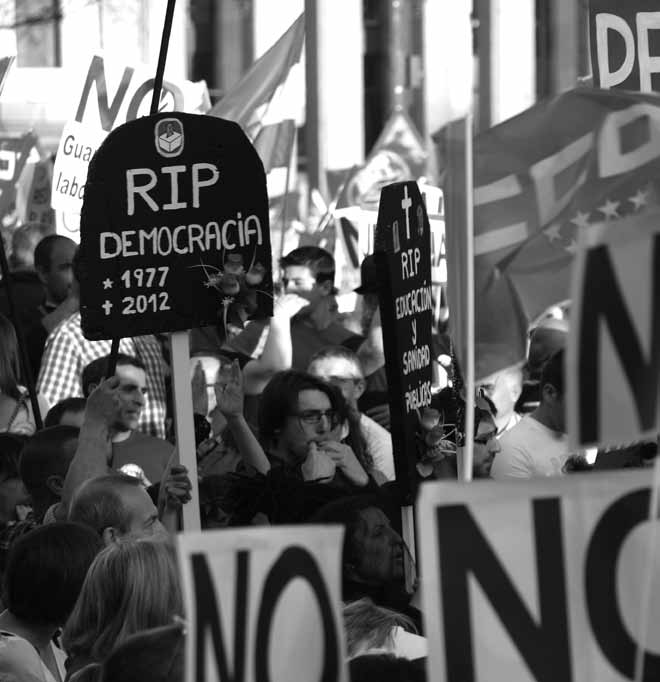 The numbers are known. In January 2012 unemployment figures in Spain passed the five million mark, which points to an incredibly high and growing number of families without any source of income. Civil servants’ salaries were frozen, and have now been cut. Such measures are being sold to many active workers as a solution to keep their jobs. Wages, already below the European average, continue to drop. The “mileurismo” – salaries of a thousand euros – long ago fell to 800 euros for hundreds of thousands of workers, especially the young. If they want keep their jobs, people are expected to accept longer hours in poor conditions, without overtime compensation.
The numbers are known. In January 2012 unemployment figures in Spain passed the five million mark, which points to an incredibly high and growing number of families without any source of income. Civil servants’ salaries were frozen, and have now been cut. Such measures are being sold to many active workers as a solution to keep their jobs. Wages, already below the European average, continue to drop. The “mileurismo” – salaries of a thousand euros – long ago fell to 800 euros for hundreds of thousands of workers, especially the young. If they want keep their jobs, people are expected to accept longer hours in poor conditions, without overtime compensation.
It is against this backdrop, and as a “long term solution” to the crisis hitting all Western economies, that Royal Decree-Law 3/2012 for Labour Reform (Spain) was approved. This move will satisfy only the aspirations of employers, by further liberalising working conditions, scuppering collective negotiation in favour of redundancy, and making everything cheaper for the bosses. In some of the new contracts, employee dismissal will come at no cost to the employer. Another postulate beyond belief is that nine days of sick leave in two months can justify a dismissal, if the employer wishes to enforce it. It is not difficult to see that none of these measures have anything to do with improvement in economic activity, nor will they lead to any growth in employment.
Thus the Labour Reform Decree has turned into the main focus of a General Strike contextualised by the frustration and rage these measures provoke in workers and throughout society. The measures being taken to mitigate the effects of the economic crisis will be disproportionately directed towards reducing all kinds of benefits, including those services considered essential for the protection of the most disadvantaged. These measures have already had a direct impact on public education and healthcare, as well as other services that could be considered of strategic importance, such as research. Meanwhile, the budget for culture has been cut so severely that it is now almost non-existent.
Nothing beyond rhetoric has been forthcoming, no effective measures have been implemented to curb extremely high rates of tax fraud in the country (there is a verified shadow economy of around 20%). A reform of the Spanish taxation system is well overdue, as it is intolerable that average employees, including the self employed, are taxed at a rate almost twice that of businesses.
The national budget proposes further cuts which will add 630,000 to the current unemployed figures, according to experts. This reveals that there is indeed a link between the proposed plans and labour reform: it was necessary to facilitate the dismissals of even more workers to meet the planned budget.
The general strike on the 29th of March did not have the widespread impact that organisers had hoped for, although it did affect whole sections of the chain of production. Key to understanding the success or failure of the strike is how employers strategized against it, and the role of the media, which is mostly pro-government, and discouraged potential strikers. Many workers were threatened with the sack if they participated. Equally, the response from trade unions lacked the force necessary to mobilise effectively and en masse, with the urgency this untenable situation calls for.
Although participation in the strike was less robust than had been hoped for, this was compensated for by a great number of demonstrations by workers (strikers and non-strikers), the unemployed (who can’t effectively strike), parents and carers, young people, students and indignados of all kinds, whose participation exceeded all forecasts. The shock reached government officials, whose parliamentary majority does not grant rule without consent. Many different social sectors and their representatives are now calling the politicians to account.
Despite this, there is no interest from the government, which acts predominantly in favour of employers, to modify what has already been approved. It is thus very likely that conflict will increase and demonstrations will grow. The greater the injustice, the more radical the workers’ responses will be.
Profound reflection is needed; an acknowledgement of the inadequacy of the latest measures, the reestablishment of balance between workers and employers, and an agreement to face the crisis with fair and proportionate measures. Right now, exactly the opposite is being proposed.
By Chus Rivas Bote, translated by Clara Rivas









